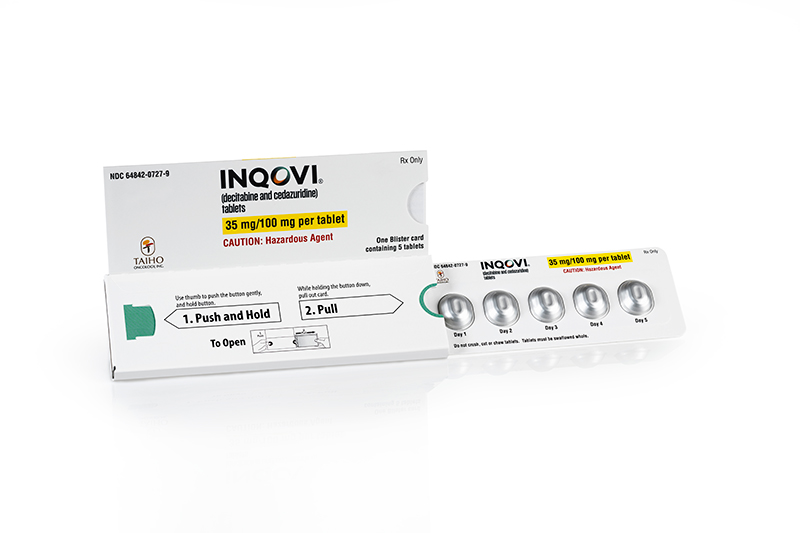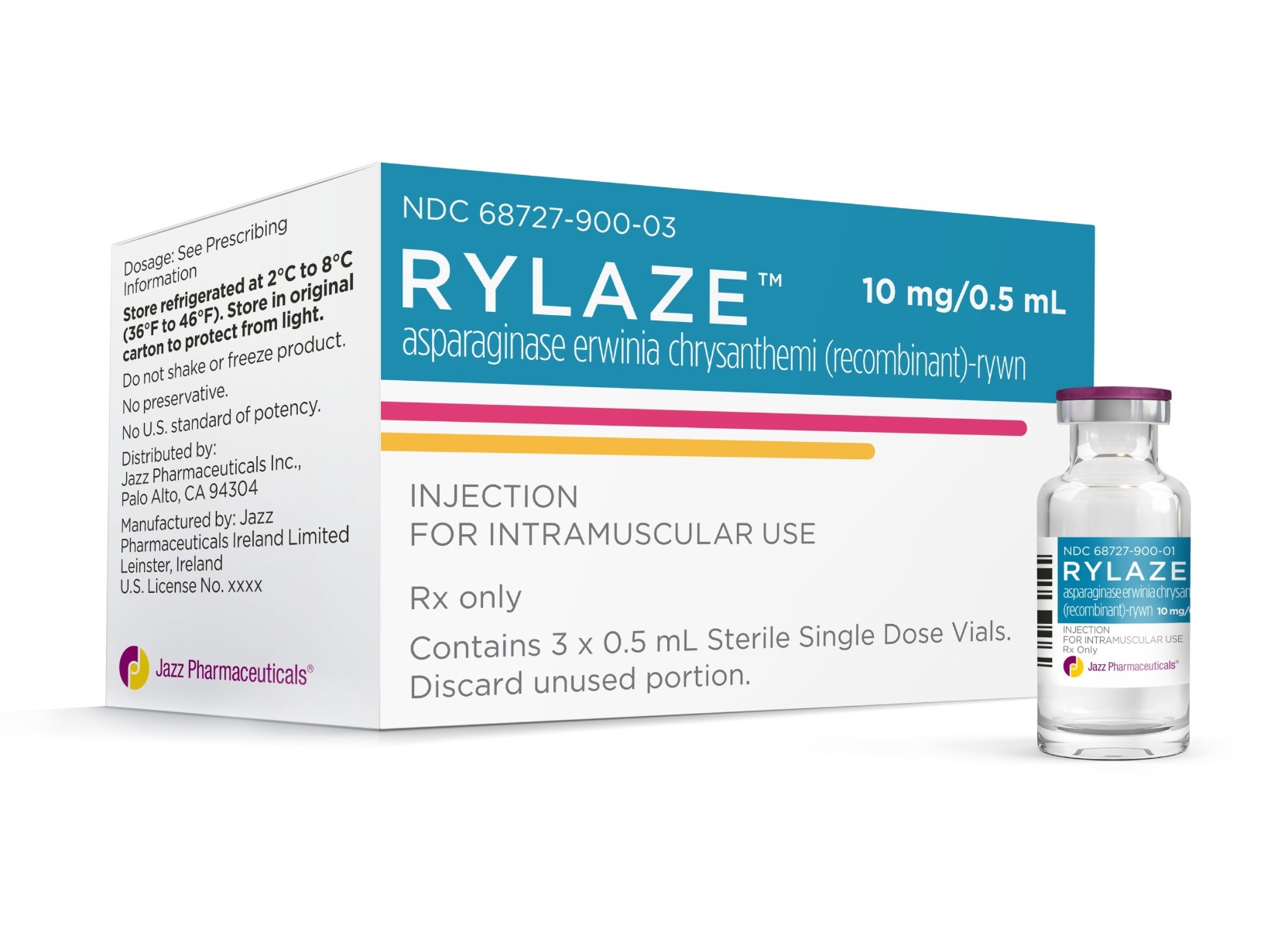Inqovi (decitabine and cedazuridine) vs Rylaze (asparaginase erwinia chrysanthemi (recombinant)-rywn)
Inqovi (decitabine and cedazuridine) vs Rylaze (asparaginase erwinia chrysanthemi (recombinant)-rywn)
Inqovi (decitabine and cedazuridine) is an oral hypomethylating agent used for the treatment of adults with myelodysplastic syndromes (MDS), including certain types of chronic myelomonocytic leukemia (CMML). Rylaze (asparaginase erwinia chrysanthemi (recombinant)-rywn) is an asparagine-specific enzyme indicated as a component of a multi-agent chemotherapeutic regimen for the treatment of acute lymphoblastic leukemia (ALL) in pediatric and adult patients who have developed hypersensitivity to E. coli-derived asparaginase. The choice between Inqovi and Rylaze would depend on the specific type of blood cancer a patient has, with Inqovi being appropriate for certain types of MDS and CMML, and Rylaze being suited for ALL, particularly in cases where there is an allergy to E. coli-derived asparaginase.
Difference between Inqovi and Rylaze
| Metric | Inqovi (decitabine and cedazuridine) | Rylaze (asparaginase erwinia chrysanthemi (recombinant)-rywn) |
|---|---|---|
| Generic name | Decitabine and cedazuridine | Asparaginase erwinia chrysanthemi (recombinant)-rywn |
| Indications | Treatment of myelodysplastic syndromes (MDS) | Treatment of acute lymphoblastic leukemia (ALL) |
| Mechanism of action | Hypomethylating agent and cytidine deaminase inhibitor | Enzyme replacement therapy that breaks down asparagine |
| Brand names | Inqovi | Rylaze |
| Administrative route | Oral | Intramuscular injection |
| Side effects | Fatigue, constipation, hemorrhage, myalgia, mucositis, arthralgia, nausea, dyspnea, diarrhea, rash, dizziness, febrile neutropenia, edema, headache, cough, decreased appetite, upper respiratory tract infection, pneumonia, transaminase increased, and blood bilirubin increased | Hypersensitivity reactions, pancreatitis, thrombosis, hemorrhage, hepatotoxicity, and elevated liver enzymes |
| Contraindications | Known hypersensitivity to decitabine or cedazuridine | History of serious hypersensitivity reactions to asparaginase |
| Drug class | Hypomethylating agent, Cytidine deaminase inhibitor | Asparagine specific enzyme |
| Manufacturer | Astellas Pharma US, Inc. | Jazz Pharmaceuticals, Inc. |
Efficacy
Inqovi (decitabine and cedazuridine) for Leukemia
Inqovi, a combination of decitabine and cedazuridine, is an oral hypomethylating agent approved by the U.S. Food and Drug Administration (FDA) for the treatment of adults with myelodysplastic syndromes (MDS), including previously treated and untreated, de novo and secondary MDS with the following French-American-British (FAB) subtypes: refractory anemia, refractory anemia with ringed sideroblasts, refractory anemia with excess blasts, and chronic myelomonocytic leukemia (CMML). MDS are a group of related blood disorders that can lead to leukemia. In clinical studies, Inqovi has demonstrated efficacy in improving hematologic parameters and reducing the need for red blood cell and platelet transfusions.
The efficacy of Inqovi for the treatment of these conditions was primarily based on results from two open-label, randomized, crossover trials. These trials compared the pharmacokinetics and pharmacodynamics of oral Inqovi to intravenous decitabine. Response rates, including complete remission (CR) and hematologic improvement, were similar between the oral and intravenous administration, indicating that Inqovi is an effective oral alternative to intravenous decitabine for patients with MDS and CMML.
Rylaze (asparaginase erwinia chrysanthemi (recombinant)-rywn) for Leukemia
Rylaze, also known as asparaginase erwinia chrysanthemi (recombinant)-rywn, is an asparagine-specific enzyme approved by the FDA as a component of a multi-agent chemotherapeutic regimen for the treatment of acute lymphoblastic leukemia (ALL) and lymphoblastic lymphoma (LBL) in pediatric and adult patients who have developed hypersensitivity to E. coli-derived asparaginase. Rylaze works by depleting the amino acid asparagine, which is necessary for the growth of leukemia cells, thereby inhibiting their proliferation.
The efficacy of Rylaze was established in a clinical trial that included patients with ALL or LBL who were hypersensitive to E. coli-derived asparaginase. The trial measured the ability of Rylaze to achieve and maintain nadir serum asparaginase activity (NSAA) above the threshold believed to be therapeutically effective. Rylaze met the predefined efficacy criteria, with a high proportion of patients maintaining the therapeutic threshold of asparaginase activity, indicating its effectiveness in this patient population. The use of Rylaze allows for continued asparaginase treatment in patients who have developed hypersensitivity to other asparaginase preparations, which is critical for the successful management of ALL and LBL.
Regulatory Agency Approvals
Inqovi
-
Food and Drug Administration (FDA), USA

-
Health Canada

Rylaze
-
Food and Drug Administration (FDA), USA

Access Inqovi or Rylaze today
If Inqovi or Rylaze are not approved or available in your country (e.g. due to supply issues), you can access them via Everyone.org.
How it works

Make an enquiry
Choose the medicine you want to buy, answer a couple of questions, and upload your prescription to speed things up. We’ll get back to you within 24 hours.


Make an enquiry
Choose the medicine you want to buy, answer a couple of questions, and upload your prescription to speed things up. We’ll get back to you within 24 hours.


Breeze through the paperwork
We'll guide you through the required documents for importing unapproved medicine, ensuring you have all the necessary information.


Get a personalized quote
We’ll prepare a quote for you, including medicine costs and any shipping, administrative, or import fees that may apply.


Receive your medicine
Accept the quote and we’ll handle the rest - sourcing and safely delivering your medicine.

Some text on this page has been automatically generated. Speak to your physician before you start a new treatment or medication.
Let's talk
If you have any questions, call us or send us a message through WhatsApp or email:
Contact us




